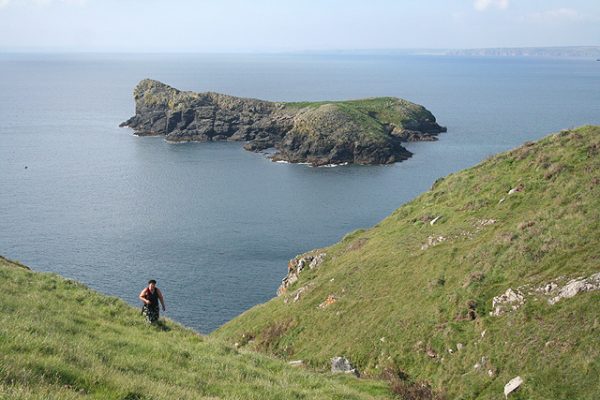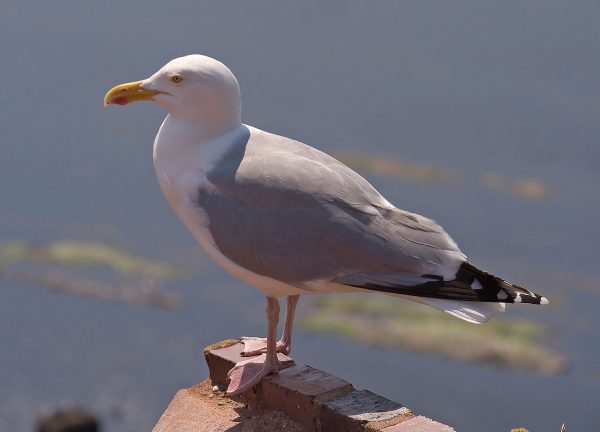Seagulls Regurgitated Thousands of Rubber Bands on an Uninhabited Cornish Island
Most of us worry about the amount of detritus we leave behind just going about our day to day lives.
It seems that everything we do during our work and leisure activities creates a trail of garbage that finds it way into the environment and hurts the birds, animals, marine life and plants.
It’s enough to cause “eco grief”, as a recent editorial in the New York Times coined it, and most of us do our best to minimize our impact on the environment the best we can.
It’s still not enough, however, as European herring gulls and black-backed gulls that live off the coast of the U.K. can attest.

Recently, a conservation group, the West Cornwall Ringing Group, went to Mullion Island off the coast to check on the gulls. It is an island free of human beings, and of late has served as a sanctuary for all manner of gulls and other birds.
To the conservationists’ astonishment, there were thousands of rubber elastic bands along the shore and all over the island.
The experts had no idea how the waste arrived, as Mullion is completely uninhabited. The group was flummoxed by the discovery, at least initially.
Unfortunately, the answer came when the gulls’ pellets were examined and, to the scientists’ shock, remains of rubber bands were found in among other, natural waste.
Pellets contain what the gulls cannot digest — tiny bones from fish, gristle, and other natural byproducts of their diet.
The bands and other bits of human waste, such as string and fishing line, are vomited back up by the birds, but they are detrimental to the creatures’ wellbeing.
According to a spokesman for the group, Mark Grantham, the sight was extremely disturbing. “To save disturbing the nesting birds,” he explained to website sciencealert.com, “we made a trip in the autumn to clear the litter. Within just an hour, we’d collected thousands of bands and handfuls of fishing waste.”
Rangers from the National Trust in the United Kingdom determined gulls are mistaking rubber bands for worms. #Conservation #Birdshttps://t.co/45EdrE1jRT pic.twitter.com/jVNBkocGul
— BirdWatchingMagazine (@BirdWatchDaily) October 31, 2019
Officials believe the birds see string wrapped around flower bunches and erringly believe them to be worms.
From the late 1960s until 2015, the gull populations in Europe and the U.K. were in serious jeopardy. Habitat loss, food scarcities because of overfishing and other factors reduced their numbers significantly.
Places like Mullion Island offer the birds a refuge, a place to rest out of harm’s way and away from the problems they encounter with man. However, it seems that even establishing alternative spots for the gulls is not enough.
“Places like Mullion Island should be a sanctuary for our seabirds,” said Rachel Holder, a ranger who keeps watch over the area’s birds and other wildlife. “It’s distressing to see them become victims of human activity.”
To help the gulls and other birds perhaps ingest less garbage, the National Trust, under whose purview the island falls, has asked citizens to start reconsidering the amount of waste they leave behind, particularly things like straws and strings, that the birds easily mistake for food.
In October, Lizzie Carlyle, head of the Trust’s Environmental Practises department commented “Single use materials are having an alarming impact on our country’s most remote places.
It’s up to all of us to take responsibility for how we use and dispose of these items — whether we are producers or consumers.”

The U.K. is certainly not the only country facing dilemmas about how to cope with the impact of waste on remote regions. In Canada, Prime Minister Justin Trudeau is weighing the merits of banning single use plastic entirely, such as straws and individual plastic cups sold at cafes and diners.
But the political risk is huge, as lobbyists for companies that produce these items put pressure on governments to soften or ignore such proposed legislation completely.
Another Article From Us: 18,000-Year-Old Frozen Puppy Found Found in Permafrost
But all countries must soon face the consequences of decades of inaction on the environmental front — or risk even more dire results a few years hence.





